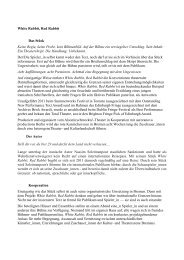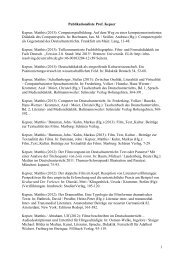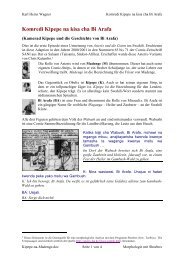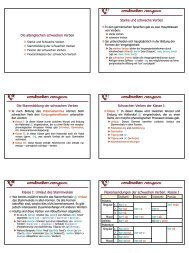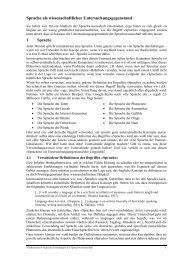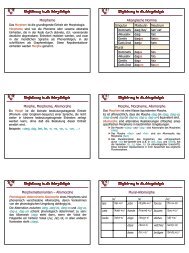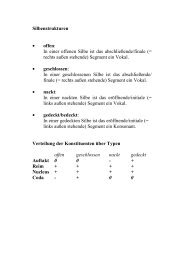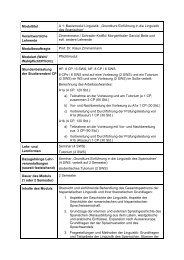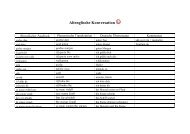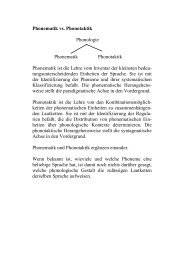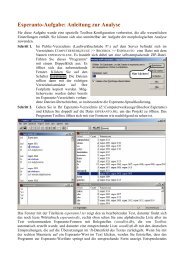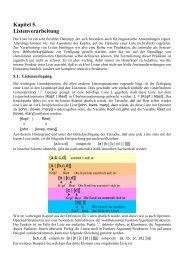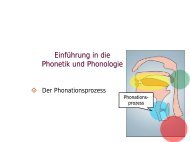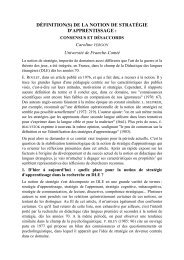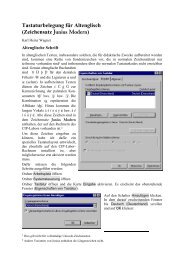Relativism and Universalism in Linguistics - Fachbereich 10 ...
Relativism and Universalism in Linguistics - Fachbereich 10 ...
Relativism and Universalism in Linguistics - Fachbereich 10 ...
Create successful ePaper yourself
Turn your PDF publications into a flip-book with our unique Google optimized e-Paper software.
134 Workshops<br />
(genauer: perfektiv-medialen) Funktion ableitbar ist, und zwar als deren modale Deutung. Das<br />
ist durchaus vergleichbar mit der temporalen Umdeutung der Aspektfunktion. Die<br />
epistemische Funktion der Modalverben entsteht wiederum unmittelbar aus deren deontischer<br />
Modalität, als deren „deiktische“ Lesart (Diewald 1999), wobei dieser Prozess sensu stricto<br />
ke<strong>in</strong>er Rekonstruktion bedarf, da er erst <strong>in</strong> der Epoche der Schriftlichkeit e<strong>in</strong>setzt und daher<br />
sehr gut nachvollzogen werden kann.<br />
Literatur (<strong>in</strong> Auswahl)<br />
Diewald, Gabriele 1999. Die Modalverben im Deutschen. Grammatikalisierung und<br />
Polyfunktionalität. Tüb<strong>in</strong>gen: Niemeyer.<br />
Kuryłowicz, Jerzy 1964. The <strong>in</strong>flectional categories of Indo-European. Heidelberg: W<strong>in</strong>ter.<br />
Stang, Christian 1932. Perfectum und Medium. Norsk tidskrift for sprokvidenska 6: 29-39.<br />
Aspect, (<strong>in</strong>)def<strong>in</strong>iteness, <strong>and</strong> modality:<br />
The <strong>in</strong>visible patterns of deonticity <strong>and</strong> epistemicity<br />
Leiss, Elisabeth<br />
LMU Munich<br />
e.leiss@germanistik.uni-muenchen.de<br />
The central thesis guid<strong>in</strong>g our research <strong>in</strong> this doma<strong>in</strong> says that aspect languages use aspectual<br />
form to encode deontic <strong>and</strong> epistemic mean<strong>in</strong>gs. On the other h<strong>and</strong>, languages which have<br />
lost aspect, develop articles <strong>and</strong> a class of modals with deontic <strong>and</strong> epistemic mean<strong>in</strong>gs. The<br />
start<strong>in</strong>g po<strong>in</strong>t is the sem<strong>in</strong>al paper presented at Tokyo by Abraham 1991, which claims that:<br />
1. modals comb<strong>in</strong>e with perfective <strong>in</strong>f<strong>in</strong>itives <strong>in</strong> order to generate deontic mean<strong>in</strong>g;<br />
2. modals comb<strong>in</strong>e with imperfective <strong>in</strong>f<strong>in</strong>itives <strong>in</strong> order to generate epistemic mean<strong>in</strong>g.<br />
Van Gelderen (2004:155) follows this l<strong>in</strong>e of argument <strong>in</strong> syntactic terms: “S<strong>in</strong>ce I argue that<br />
(deontic) modals merge as ASP, this raises the question as to what modals have <strong>in</strong> common<br />
with aspect“.<br />
What k<strong>in</strong>d of shared grammatical mean<strong>in</strong>g attracts perfectivity to deonticity? The common<br />
denom<strong>in</strong>ator to be found has to deal with some more strik<strong>in</strong>g data: A strong aff<strong>in</strong>itiy between<br />
non-f<strong>in</strong>iteness <strong>and</strong> deontic mean<strong>in</strong>g <strong>in</strong> contrast to an apparent aff<strong>in</strong>ity between f<strong>in</strong>iteness <strong>and</strong><br />
epistemic mean<strong>in</strong>g (Abraham 2001, 2002; Hyams2005).<br />
In the present paper, historical evidence support<strong>in</strong>g these correlations will be presented. In<br />
Old <strong>and</strong> Middle High German perfective verbs are used more frequently <strong>in</strong> non-f<strong>in</strong>ite form<br />
(Behaghel 1923/1989:<strong>10</strong>3-<strong>10</strong>4). This focus on the aff<strong>in</strong>ity of perfectivity <strong>and</strong> non-f<strong>in</strong>iteness is<br />
very reveal<strong>in</strong>g as to the direction where to f<strong>in</strong>d the hidden patterns of deonticity <strong>and</strong><br />
epistemicity such as suggested <strong>in</strong> Leiss (2002).<br />
References:<br />
Abraham, Werner (1991): Modalverben <strong>in</strong> der Germania. In: Iwasaki, E.: (ed.): Begegnung<br />
mit dem “Fremden”. Grenzen – Traditionen – Vergleiche. Akten des VIII.<br />
Internationalen Germanisten-Kongresses <strong>in</strong> Tokyo 1990. München 1991, vol. 4, <strong>10</strong>9-118.<br />
Abraham, Werner (2001): Modals: toward expla<strong>in</strong><strong>in</strong>g the ‘epistemic non-f<strong>in</strong>iteness gap’. In:<br />
Müller/Reis 2001, 7-36.<br />
Behaghel, Otto (1923/1989): Deutsche Syntax. E<strong>in</strong>e geschichtliche Darstellung. Vol. 2, 2nd<br />
unrevised editon 1989. Heidelberg: W<strong>in</strong>ter 1923<br />
Gelderen, Elly van (2004): Grammaticalization as Economy. Amsterdam, Philadelphia:<br />
Benjam<strong>in</strong>s 2004. [L<strong>in</strong>guistik Aktuell / L<strong>in</strong>guistics Today 71].



